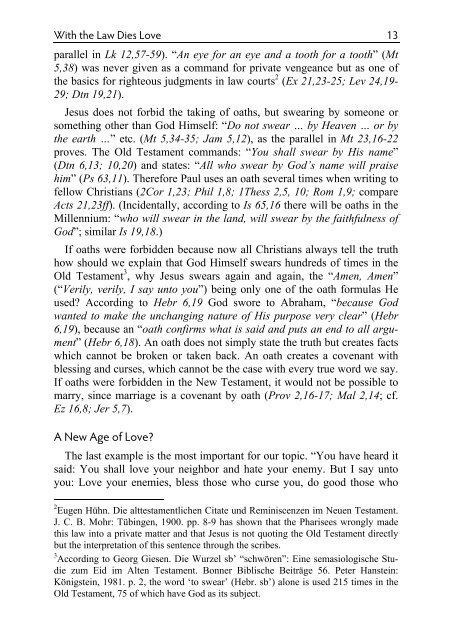Love is the Fulfillment of Law - World Evangelical Alliance
Love is the Fulfillment of Law - World Evangelical Alliance
Love is the Fulfillment of Law - World Evangelical Alliance
You also want an ePaper? Increase the reach of your titles
YUMPU automatically turns print PDFs into web optimized ePapers that Google loves.
With <strong>the</strong> <strong>Law</strong> Dies <strong>Love</strong> 13<br />
parallel in Lk 12,57-59). “An eye for an eye and a tooth for a tooth” (Mt<br />
5,38) was never given as a command for private vengeance but as one <strong>of</strong><br />
<strong>the</strong> basics for righteous judgments in law courts 2 (Ex 21,23-25; Lev 24,19-<br />
29; Dtn 19,21).<br />
Jesus does not forbid <strong>the</strong> taking <strong>of</strong> oaths, but swearing by someone or<br />
something o<strong>the</strong>r than God Himself: “Do not swear … by Heaven … or by<br />
<strong>the</strong> earth …” etc. (Mt 5,34-35; Jam 5,12), as <strong>the</strong> parallel in Mt 23,16-22<br />
proves. The Old Testament commands: “You shall swear by H<strong>is</strong> name”<br />
(Dtn 6,13; 10,20) and states: “All who swear by God’s name will pra<strong>is</strong>e<br />
him” (Ps 63,11). Therefore Paul uses an oath several times when writing to<br />
fellow Chr<strong>is</strong>tians (2Cor 1,23; Phil 1,8; 1Thess 2,5, 10; Rom 1,9; compare<br />
Acts 21,23ff). (Incidentally, according to Is 65,16 <strong>the</strong>re will be oaths in <strong>the</strong><br />
Millennium: “who will swear in <strong>the</strong> land, will swear by <strong>the</strong> faithfulness <strong>of</strong><br />
God”; similar Is 19,18.)<br />
If oaths were forbidden because now all Chr<strong>is</strong>tians always tell <strong>the</strong> truth<br />
how should we explain that God Himself swears hundreds <strong>of</strong> times in <strong>the</strong><br />
Old Testament 3 , why Jesus swears again and again, <strong>the</strong> “Amen, Amen”<br />
(“Verily, verily, I say unto you”) being only one <strong>of</strong> <strong>the</strong> oath formulas He<br />
used? According to Hebr 6,19 God swore to Abraham, “because God<br />
wanted to make <strong>the</strong> unchanging nature <strong>of</strong> H<strong>is</strong> purpose very clear” (Hebr<br />
6,19), because an “oath confirms what <strong>is</strong> said and puts an end to all argument”<br />
(Hebr 6,18). An oath does not simply state <strong>the</strong> truth but creates facts<br />
which cannot be broken or taken back. An oath creates a covenant with<br />
blessing and curses, which cannot be <strong>the</strong> case with every true word we say.<br />
If oaths were forbidden in <strong>the</strong> New Testament, it would not be possible to<br />
marry, since marriage <strong>is</strong> a covenant by oath (Prov 2,16-17; Mal 2,14; cf.<br />
Ez 16,8; Jer 5,7).<br />
A New Age <strong>of</strong> <strong>Love</strong>?<br />
The last example <strong>is</strong> <strong>the</strong> most important for our topic. “You have heard it<br />
said: You shall love your neighbor and hate your enemy. But I say unto<br />
you: <strong>Love</strong> your enemies, bless those who curse you, do good those who<br />
2 Eugen Hühn. Die alttestamentlichen Citate und Remin<strong>is</strong>cenzen im Neuen Testament.<br />
J. C. B. Mohr: Tübingen, 1900. pp. 8-9 has shown that <strong>the</strong> Phar<strong>is</strong>ees wrongly made<br />
th<strong>is</strong> law into a private matter and that Jesus <strong>is</strong> not quoting <strong>the</strong> Old Testament directly<br />
but <strong>the</strong> interpretation <strong>of</strong> th<strong>is</strong> sentence through <strong>the</strong> scribes.<br />
3 According to Georg Giesen. Die Wurzel sb’ “schwören”: Eine semasiolog<strong>is</strong>che Studie<br />
zum Eid im Alten Testament. Bonner Bibl<strong>is</strong>che Beiträge 56. Peter Hanstein:<br />
Königstein, 1981. p. 2, <strong>the</strong> word ‘to swear’ (Hebr. sb’) alone <strong>is</strong> used 215 times in <strong>the</strong><br />
Old Testament, 75 <strong>of</strong> which have God as its subject.

















